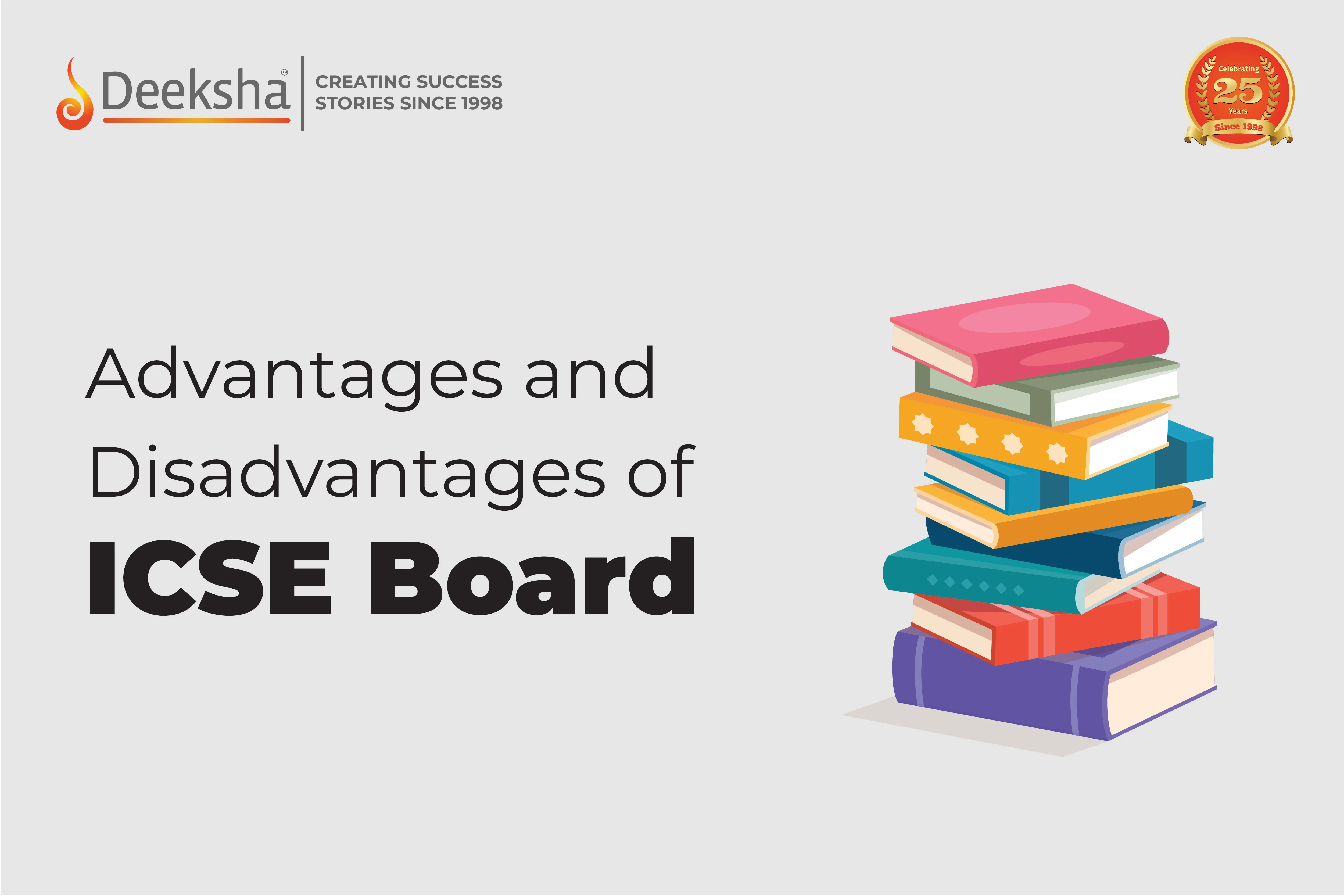The education of a youngster is essential to their future. Parents want to be absolutely convinced that they are selecting the greatest school for their children as a result. But with so much information available online and so many different viewpoints from friends and family, making an objective, an informed decision is quite challenging. This is why parents today prefer to seek the advice of professionals when selecting an educational organization for their children.
This article provides all the information you need to know about the ICSE board of education and gives thorough explanations of the ICSE syllabus and the advantages and disadvantages of the ICSE board.
Indian Council of Secondary Education ( ICSE)
The ICSE board stands for Indian Certificate of Secondary Education. The board is well-known both in India and internationally and is a preferred option for students.
A private organization called the Council for the Indian School Certificate Examinations (CISCE) administers the ICSE exams in accordance with the New Education Policy.
The CISCE body is a forward-thinking organization that is always adjusting to more modern teaching methods. Because of its extensive syllabus and cutting-edge teaching methods, the ICSE curriculum is well-known.
The ICSE test curriculum from class 1 to class 10 is detailed below.
- 1st to 5th grades: The council concentrates more on honing pupils’ abilities. Every CISCE-affiliated school is free to choose any textbooks for classes 1 through 5. For each subject, the board has requirements that schools must adhere to in order to make the curriculum applicable to the CISCE board students.
- 6th through 10th grade: The council also provides recommendations and a well-structured syllabus for grades 6, 7, 8, 9, and 10. Also, the council offers a list of books from which schools can select novels for their students. The council has not established any textbooks. The ICSE curriculum’s academic areas have been arranged in a matrix arrangement. A method based on themes is used for each subject. Learning Objectives have been determined for each theme. They were provided at the start of the ICSE Curriculum, following each description of a theme.
- Board Test for ICSE Class 10: The Council for the Indian School Certificate Examinations organizes the Indian Certificate of Secondary Education (ICSE) exam for Class 10 students. In accordance with the New Education Policy of 1986, the Indian Certificate of Secondary Education (ICSE) was created to offer an exam during general education. Students in Class 10 take the ICSE Class 10 Board exam. The test consists of 7 subjects; 4 of them are required, while the remaining three are elective. All ICSE Board exams at the secondary school level are administered by the CISCE in topics like English, History, Science, Commercial Studies, Environmental Science, and others.
Advantages of ICSE Board
Selecting the finest board and school is crucial if you want to provide your child with the greatest education possible. The following are the advantages of the ICSE board:
- Global Recognition: The fact that the board is respected on a national and worldwide level is one of the major benefits of the ICSE curriculum. Foreign nations view the ICSE syllabus as on par with the high school exams held in their country, in addition to being on par with the recognized boards in India. As a result, ICSE is regarded as an internationally renowned board that is respected in India as well as everywhere else.
- Huge potential for the future: The ICSE curriculum includes global knowledge, stimulates critical thinking, and offers fresh teaching approaches. Students can now pursue higher education abroad, thanks to this. Because ICSE board students have a solid foundation in English, they have an advantage while taking the IELTS and TOEFL tests. Several ICSE institutions provide creative disciplines, including agriculture, fashion design, home science, cooking, and many more cutting-edge topics. Hence, by enrolling in an ICSE school, you will undoubtedly have the opportunity to study your chosen pastime.
- Real-world participation and evaluation: The ICSE curriculum’ design calls for students to go beyond textbooks, explore their labs, and gain practical experience in order to gain a useful understanding of the principles they have learned in class. As a result, students learn in a richer environment that goes beyond memory. Moreover, project work, research, group projects, and internal assessment are given a significant weighting, allowing students the chance to demonstrate their aptitude in addition to performing well on exams.
- Solid fundamentals and foundation: Students are encouraged to broaden their interests and acquire a curious, inquisitive, and analytical attitude to learning as a result of a conscious effort to prioritize quality content over quantity. The methodology has evolved over time to stress an all-encompassing, immersive, and dynamic system rather than the commonly imagined one-way information flow. As a result, education has improved in both standard and quality, and students now have a strong foundation for any career route they may select.
- Rich, well-balanced, and beneficial content: The syllabus’s content is comprehensive and in-depth to aid students in comprehending it better. An ICSE education achieves that and more, despite the claim that a CBSE education places a larger emphasis on math and science with a bigger aim to prepare pupils for different entrance tests. While emphasizing math and science principles, ICSE also gives equal weight to languages, the arts, and the humanities. This enables education to be more diverse, well-rounded, and healthy. Language proficiency is the main objective of education that uses English as the primary language. While submitting their applications to universities overseas for higher education, students will benefit from this.
- Children with special needs are given advantages: The council gives candidates with certain types of disabilities extra consideration and makes the necessary accommodations to support them so that their performance during the ICSE and ISC Exams is not impacted.
- Competitive Nature: The ICSE board sponsors numerous interschool tournaments for students and instructors in order to foster a culture of competitiveness among ICSE schools. These honors are highly regarded and are given across all of India. Teachers and students who work hard to win these honors find encouragement in them. It motivates both students and teachers to provide their best effort. This is an important advantage of the ICSE board.
- Qualified faculty members: The ICSE board’s highly competent faculty members for all streams are the last advantage of attending. The instructors have extensive education, professional experience, and subject-matter expertise. They are well-versed in their field and can offer you appropriate advice to help you do well on tests like the SSC CGL Test or SSC CGL Mock Test and other competitive exams like the JEE Main, NEET RANKED TEST, etc.
- Inclusion of Internal assessment: Another reason why the ICSE board is superior is that internal assessments are taken into account when evaluating students’ overall performance, giving them more room to improve. The board evaluates pupils based on internal evaluations and adheres to a comprehensive approach to education.


Disadvantages of the ICSE Board
All subjects are given equal weight in the ICSE board’s syllabus. The ICSE certification is recognized all over the world. Yet, the following are some disadvantages of the ICSE board:
- A difficult syllabus: The syllabus will be difficult for an ordinary student because ICSE students give thirteen subject tests during the sixth standard, whilst other boards give six subject exams in the same class. Although ICSE encourages learning, greater life skills, and analytical abilities, it might be challenging for pupils to continue their education beyond high school.
- Less faculty: Due to a shortage of teachers, ICSE board students cannot get quality private instruction in their area.
- Greater emphasis on English as a Language: Because of its emphasis on English grammar and literature, ICSE may be challenging for some students. The Hindi language is also highlighted. For pupils who struggle to learn new languages or don’t know the language, this is not promising.
- Expensive: ICSE is much more expensive than the government-run boards in India, despite being the least expensive option for global education. Parents are burdened by the high tuition costs that many schools impose. Affordable tuition often means fewer resources for the school, which has an impact on education quality.
- Extra Work: Sometimes, during the exam season, when all the teachers have to complete the course, there are some extra books for the students of ICSE. Due to this, students and teachers both get pressured and do not concentrate on the syllabus. Because of the extensive curriculum and difficult access to textbooks and tuition, students are under a great deal of stress due to the subject content and schoolwork, which is quite challenging for many.
- The pattern is not upto the mark: The emphasis in the ICSE board is mostly on theoretical knowledge. Students are only instructed to study for exams. This causes students to lack practical information in their minds. This disqualifies students from employment in business or industry. So, to succeed in the market, any student must have practical knowledge, and increasing the proportion of practical knowledge is necessary to improve students’ skills.
- Difficult grading system: The grading system is highly rigorous and is known as one of India’s extensive academic education systems.
Overcoming Procrastination in 10th Grade
Frequently Asked Questions Around ICSE Board
General Information about ICSE Board
The Indian Certificate of Secondary Education (ICSE) and the Council for the Indian School Certificate Examinations (CISCE) are key components of the Indian educational system, recognized for their rigorous academic standards. These boards are known for their comprehensive and in-depth coverage of subjects and are recognized across India and abroad.
What distinguishes the ICSE from the ISC?
The curriculum for grades 1 through 10 is called ICSE. ISC is the board curriculum for grades 11 and 12, in contrast.
In India, how many ICSE schools are there?
In India, there are approximately 2535 ICSE schools.
What is an ICSE board?
The ICSE board refers to the Indian Certificate of Secondary Education. It is an examination conducted by the Council for the Indian School Certificate Examinations (CISCE), a private, non-governmental board of school education in India. ICSE is known for its extensive syllabus and focus on detailed study, aimed at providing a well-rounded education that prepares students for further education globally.
The CISCE board stands for the Council for the Indian School Certificate Examinations. It is a privately held national-level board of school education in India that conducts the ICSE (Class 10) and ISC (Indian School Certificate, Class 12) examinations. The CISCE is committed to serving the nation’s children through high quality educational endeavors, empowering them to contribute towards a humane, just, and pluralistic society.
Is the ICSE board recognized in India?
Yes, the ICSE board is fully recognized in India. It is one of the well-known boards in the Indian educational landscape, alongside CBSE and various state boards. The ICSE certification is accepted by most schools and colleges across India and is also recognized by many foreign education systems, making it a viable option for students planning to pursue higher education abroad.
Is ICSE a private board?
Yes, the ICSE is a private board. It is administered by the Council for the Indian School Certificate Examinations, which is a non-governmental educational organization. Despite being a private entity, ICSE is widely accepted both nationally and internationally, adhering to high educational standards similar to other central educational boards in India.
Comparisons Between CBSE and ICSE
Choosing between CBSE (Central Board of Secondary Education) and ICSE (Indian Certificate of Secondary Education) can be a significant decision for students and parents, as each board has its distinct educational approach, focus, and recognition. These boards are designed to cater to different educational needs and prepare students for various future opportunities.
CBSE or ICSE, which is better?
Choosing between CBSE and ICSE depends on individual educational needs and future goals. CBSE is known for its standardized curriculum that is aligned with competitive exams like JEE and NEET, making it popular among students aiming for engineering and medical careers. ICSE, on the other hand, offers a more balanced and comprehensive curriculum with a detailed focus on language and arts, as well as science and mathematics, which can be beneficial for students aiming for a holistic education.
CBSE or ICSE, which is better for the future?
Both CBSE and ICSE prepare students for future academic and professional success but in different ways. CBSE’s curriculum is more focused on preparing students for national entrance exams and is widely recognized in Indian colleges and universities. ICSE provides a broader educational base with a stronger emphasis on English and humanities, which may benefit students planning to study abroad or in diverse fields.
What is the difference between CBSE and ICSE?
The primary difference between CBSE and ICSE is their curricular focus and assessment methods. CBSE focuses on a more science and math-oriented curriculum, aligning with major national entrance exams. ICSE offers a more balanced curriculum with equal emphasis on language, arts, and science, promoting detailed study and diverse subject knowledge. The assessment in ICSE is more comprehensive, including varied types of questions that evaluate analytical skills and practical knowledge beyond rote learning.
Which board is best in India?
The best educational board in India depends on the student’s learning style, career goals, and educational needs. CBSE is preferred by those looking for straightforward and concise syllabi aligned with competitive examinations. ICSE is favored for its rigorous and broad-based curriculum that enhances analytical skills and prepares students for diverse academic challenges. The choice should be made based on which curriculum better suits the student’s future aspirations and learning preferences.
Which syllabus is best: CBSE or ICSE?
The choice between CBSE and ICSE syllabi depends on what the student and parents value in education. The CBSE syllabus is concise and oriented towards preparing students for national competitive exams, making it suitable for students with a clear focus on entering fields like engineering or medicine. The ICSE syllabus offers a wider scope, with a balanced focus on languages, arts, and sciences, ideal for students seeking a well-rounded education.
CBSE vs ICSE vs State Board, which is better?
Choosing between CBSE, ICSE, and State Boards should be based on the student’s academic and professional aspirations. CBSE is nationally recognized and known for its streamlined curriculum, ICSE is appreciated for its comprehensive and challenging curriculum, and State Boards offer curriculum that aligns closely with local educational requirements and may benefit those planning to continue their education locally.
Which is the toughest board in India?
In terms of curriculum breadth and depth, ICSE is often considered the toughest board in India due to its extensive syllabus and emphasis on detailed study. However, the term “toughest” can vary based on a student’s individual strengths and academic preferences.
ICSE or CBSE, which is tough?
ICSE is generally considered tougher than CBSE because it has a more comprehensive and voluminous syllabus that covers a broader range of subjects with greater depth. This includes detailed assessments that test students’ understanding and analytical abilities across diverse subjects. However, for students aiming at specific national entrance exams, CBSE might seem tougher due to its focus on preparing students for these tests.
Curriculum and Syllabus Specifics
The ICSE (Indian Certificate of Secondary Education) syllabus is recognized for its comprehensive structure that aims to provide students with a well-rounded educational foundation, focusing on depth and analytical skills. The curriculum is extensive, encouraging detailed study and application of concepts across various subjects.
What is the ICSE syllabus?
The ICSE syllabus is a detailed and structured curriculum designed by the Council for the Indian School Certificate Examinations. It encompasses a wide range of subjects including English, Math, Science, Social Studies, and a choice of optional languages or technical subjects. The syllabus is known for its focus on English literacy, critical thinking, and flexibility, allowing students to explore a broad spectrum of educational disciplines in depth.
ICSE syllabus – why is it better and why?
Many educators and parents consider the ICSE syllabus superior due to its emphasis on comprehensive and in-depth study, particularly in English and the humanities. The syllabus encourages analytical thinking and problem-solving skills, preparing students for academic and personal success in a variety of fields, including higher education abroad. It promotes a balanced approach to education, which is beneficial in developing well-rounded individuals.
ICSE follows which books?
ICSE does not prescribe specific textbooks for its curriculum, allowing schools the flexibility to choose from a range of books that meet the syllabus requirements set by the CISCE. Schools typically select books published by reputable publishers that align closely with the ICSE standards, ensuring a comprehensive coverage of each subject’s syllabus. This allows teachers to tailor the learning experience to best suit their students’ needs.
How many subjects are there for the ICSE board exam?
Students taking the ICSE board exams are required to study a minimum of six subjects, with English as a compulsory subject. The standard subjects include a second language, Social Studies (History, Civics & Geography), Mathematics, Science (Physics, Chemistry, Biology), and one optional subject which could be from a range of additional languages, arts, or technical studies.
What are the total marks for the ICSE Board exam?
The ICSE Board exams typically involve papers with a total of 100 marks each. Most subjects are divided into theory and practical components, with the marks distribution varying based on the subject’s nature. For example, theoretical subjects like History and Geography may have a full mark allocation to written exams, while subjects like Science and Computer Applications include marks for practical assessments and projects.
Academic and Career Preparation
The Indian Certificate of Secondary Education (ICSE) is known for its rigorous and broad curriculum that provides a strong academic foundation. This often leads to questions about how well ICSE prepares students for competitive entrance exams like the Joint Entrance Examination (JEE) and the National Eligibility cum Entrance Test (NEET), which are crucial for students aspiring to enter engineering and medical fields, respectively.
Can ICSE students crack JEE?
Yes, ICSE students can successfully crack the JEE. While the ICSE curriculum is broad and focuses heavily on detailed understanding and application, many students from ICSE backgrounds excel in JEE due to their strong foundation in critical thinking and analytical skills. However, success in JEE also depends on additional preparation specifically tailored towards the exam’s syllabus, which is heavily based on the CBSE curriculum, necessitating ICSE students to adapt and often supplement their studies with extra coaching.
Is ICSE good for JEE?
ICSE can be a good preparation ground for JEE, as it encourages detailed study and a strong grasp of fundamental concepts, particularly in subjects like Mathematics and Science, which are crucial for JEE. The key challenge for ICSE students is to align their broader knowledge base with the specific requirements of the JEE syllabus, which might require focused study and additional coaching in the specific formats and problem types that JEE emphasizes.
Can ICSE students crack NEET?
ICSE students are certainly capable of cracking NEET. The ICSE syllabus provides a robust foundation in Biology, Chemistry, and Physics, which are core to the NEET exam. However, like with JEE, ICSE students might need additional preparation to align with the NEET syllabus, as it is tailored more closely to the CBSE standards. Dedicated preparation and understanding of the exam format are essential for success.
Is ICSE good for NEET?
The ICSE curriculum’s comprehensive approach to science subjects provides a strong conceptual foundation that is beneficial for NEET preparations. However, ICSE students may find that they need to adjust to the specific requirements of the NEET exam, particularly the style of questioning and the breadth of the syllabus. With proper planning and targeted preparation, ICSE students can perform well in NEET. Additional coaching or self-study to cover any gaps between the ICSE curriculum and NEET requirements is often advisable.
Administrative Concerns
Navigating administrative concerns such as transferring between different educational boards in India, such as CBSE (Central Board of Secondary Education) and ICSE (Indian Certificate of Secondary Education), requires understanding the logistics and timing of such changes. This transition can impact a student’s learning trajectory, so careful consideration and planning are essential.
Can we switch from CBSE to ICSE?
Yes, it is possible to switch from CBSE to ICSE, but it involves some administrative procedures. Families need to contact potential ICSE schools to inquire about the admission process and any specific requirements they might have. Since ICSE has a different curriculum and may be more rigorous in some subjects, the school might assess the student’s current academic status to ensure they can cope with the change. Transitioning earlier in the academic career, such as at the beginning of middle school, is often easier for the student.
Can we transfer from ICSE to CBSE?
Switching from ICSE to CBSE is permissible and sometimes simpler than the reverse due to the more widespread availability of CBSE schools. Parents should approach the desired CBSE school to understand their specific transfer and admission requirements, which might include documentation proving the student’s educational history and achievements. The school might also conduct assessments to ensure the student is prepared for the transition, particularly if the change occurs at a higher class level.
Which class is the best to switch curriculums?
The best time to switch curriculums generally is before significant academic milestones occur, such as before starting middle school (around Class 6) or immediately after. This timing helps minimize disruption and allows the student to adjust to a new curriculum before facing critical examinations that can influence their future educational opportunities. Switching just before Class 10 is less advised due to the proximity to board examinations, which can greatly affect a student’s adjustment and performance.
Conclusion
One of the most well-liked boards in the nation is ICSE. The ICSE curriculum encourages students who are interested in management and other professional courses to enroll. India has several ICSE board schools spread out over the nation, making it one of the most well-liked options for students.
Table of Contents















Get Social